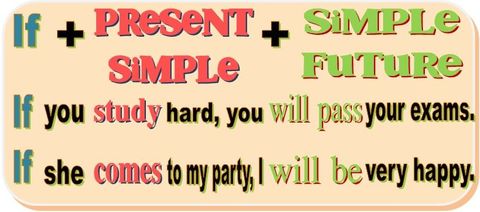
The First Conditional
The first conditional has the present simple after 'if', then the future simple in the other clause:
- if + present simple, ... will + infinitive
It's used to talk about things which might happen in the future. Of course, we can't know what will happen in the future, but this describes possible things, which could easily come true.
- If it rains, I won't go to the park.
- If I study today, I'll go to the party tonight.
We can even switch will and if so sentences look like this:
- She'll be late if the train is delayed.
- She'll miss the bus if she doesn't leave soon.
More examples are here, try completing them:
Put the verb into the correct first conditional form:
1. If I __________________ (go) out tonight, I __________________ (go) to the
cinema.
2. If you __________________ (get) back late, I __________________ (be)
angry.
3. If we __________________ (not / see) each other tomorrow, we
__________________ (see) each other next week.
4. If he __________________ (come), I __________________ (be) surprised.
5. If we __________________ (wait) here, we __________________ (be) late.
6. I __________________ (come) early if you __________________ (want).
7. They __________________ (go) to the party if they __________________
(be) invited.
8. She __________________ (stay) in London if she __________________ (get)
a job.
9. He __________________ (not / get) a better job if he __________________
(not / pass) that exam.
10. I __________________ (buy) a new dress if I __________________ (have)
enough money.
1. If I go out tonight, I'll go to the cinema.
2. If you get back late, I'll be angry.
3. If we don’t see each other tomorrow, we'll see each other next week.
4. If he comes, I'll be surprised.
5. If we wait here, we'll be late.
6. I’ll come early if you want.
7. They’ll go to the party if they are invited.
8. She’ll stay in London if she gets a job.
9. He won’t get a better job if he doesn't pass that exam.
10. I’ll buy a new dress if I have enough money.